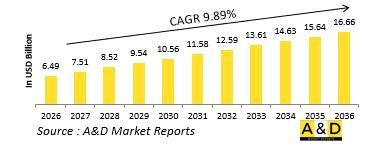
세계의 방위용 다기능 디스플레이(MFD) 시장 규모는 2026년 64억 9,000만 달러로 평가되었고, 2026-2036년의 예측 기간 동안 CAGR은 9.89%로 성장할 것으로 보이며, 2036년까지 166억 6,000만 달러에 이를 것으로 전망됩니다.

세계의 방위용 다기능 디스플레이(MFD) 시장은 군용 항공기, 지상 차량 및 해군 플랫폼의 운용자에게 중요한 비행, 임무, 센서 및 무기 데이터를 통합하여 제공하는 첨단 디지털 디스플레이 시스템을 포괄합니다. MFD는 기존의 아날로그 계기 및 단일 기능 디스플레이를 대체하여 상황 인식을 향상시키고 조종사의 작업 부하를 줄이며 의사 결정 속도를 개선하는 통합되고 맞춤 설정 가능한 인터페이스를 제공합니다. 이 고해상도 내구성 디스플레이는 현대식 조종실 및 지휘 센터 설계에 필수적이며, 공중전, 정찰, 네트워크 중심전과 같은 복잡한 임무를 지원합니다. 군사 작전이 데이터 집약적으로 변함에 따라 터치 및 제스처 제어 기능을 갖춘 더 크고 밝으며 직관적인 MFD에 대한 수요가 지속적으로 증가하여 차세대 방위 플랫폼의 핵심 컴포넌트로 자리매김하고 있습니다.
기술 발전은 MFD의 진화를 더 큰 통합성, 지능화, 상호운용성 방향으로 이끌고 있습니다. 햇빛 아래에서도 가독성이 보장되는 대형 고휘도 OLED 및 LCD 패널로의 전환은 모든 조명 조건에서 선명함을 보장합니다. 터치스크린과 햅틱 피드백 인터페이스는 고진동 환경에서도 직관적인 상호작용을 가능하게 합니다. 헬멧 장착 디스플레이 및 증강 현실 시스템과의 통합은 헤드업 디스플레이와 헤드다운 디스플레이 간 원활한 데이터 흐름을 제공합니다. 고급 그래픽 프로세서는 3D 지형, 센서 융합 출력, 합성 시각의 실시간 렌더링을 가능하게 합니다. 또한 MFD는 점차 소프트웨어 정의 방식으로 전환되어 역할 기반 재구성 및 새로운 센서나 임무 시스템 지원을 위한 간편한 업데이트가 가능합니다. 이러한 혁신들은 MFD를 수동적 디스플레이 장치에서 능동적이고 지능적인 임무 관리 허브로 변모시키고 있습니다.
주요 촉진요인은 군용 항공기, 장갑차, 해군 함정의 지속적인 현대화로, 기존 아날로그 계기판을 통합 디지털 글래스 콕핏으로 교체해야 합니다. 센서 시스템의 복잡성 증가와 네트워크 중심전(Network-Centric Warfare)은 방대한 데이터를 일관되게 융합 및 표시할 수 있는 디스플레이를 요구합니다. 승무원 작업 부하 감소와 인간-기계 협업 강화 필요성은 보다 직관적이고 자동화된 디스플레이 시스템을 촉진합니다. 안전 및 운영 효율성 요구사항 역시 MFD 채택을 촉진하는데, MFD는 향상된 지형 인식, 장애물 경고, 시스템 상태 모니터링 기능을 제공할 수 있기 때문입니다. 또한 개방형 아키텍처 항공전자 시스템으로의 추세는 다양한 플랫폼 유형에 걸쳐 전개 가능한 확장성 및 업그레이드 가능한 MFD 솔루션의 기회를 창출합니다.
북미는 차세대 항공전자 장비로 전투기, 운송기, 회전익 항공기 함대를 업그레이드하는 대규모 프로그램에 힘입어 시장을 주도하고 있습니다. 유럽은 유로파이터 업그레이드 및 미래 전투 항공 시스템(FCAS)과 같은 다국적 프로그램에 상당한 투자를 하며 상호 운용성과 표준화된 인간-기계 인터페이스를 강조하고 있습니다. 아시아태평양 지역은 인도, 한국, 일본 등의 국가에서 자체 전투기 개발 프로그램과 함대 현대화 노력으로 인해 급속한 성장을 경험하고 있습니다. 중동은 최신 디스플레이 기술로 첨단 전투기 및 공격 헬리콥터 함대를 업그레이드하는 데 막대한 투자를 하고 있습니다. 전 세계적으로 조종사 보조 기능을 지원하고 전투기 내 연결성을 강화하는 더 크고 통합된 디스플레이로 추세가 이동하고 있습니다.
고성능 마이크로 디스플레이 및 애플리케이션 특화 광학 솔루션의 선도적 개발사인 코핀 코퍼레이션(Kopin Corporation)은 증강 현실 기능을 통합한 조종사용 헬멧 장착 디스플레이 시스템(HMD)용 첨단 마이크로 디스플레이 기술을 공급하기 위해 750만 달러 규모의 다년 계약을 수주했습니다. 이 시스템은 중요한 비행 및 임무 데이터를 조종사의 시야 내에 직접 중첩 표시하여 상황 인식을 향상시키도록 설계되었습니다. 이번 최신 계약은 올해 초 조종사 헬멧 디스플레이 솔루션으로 확보한 총 600만 달러 규모의 기존 수주에 더해져, 코핀의 헬멧 장착형 디스플레이 프로그램 누적 수주액은 올해 현재까지 1,350만 달러에 달합니다. 지속적인 주문 증가세는 복잡한 비행 환경에서 작전 효율성, 안전성 및 의사결정을 개선하는 몰입형 시각화 기술에 대한 수요 증가를 반영합니다. 해당 프로그램의 고객사는 미국 국방부 생태계 내 1차 주요 계약사로, 세계적인 항공우주 및 방위 시스템 공급업체 중 하나입니다. 코핀의 마이크로 디스플레이는 차세대 헬멧 시스템에서 핵심적인 역할을 수행할 것으로 예상되며, 군용 항공 플랫폼 전반에 걸쳐 첨단 항공전자 통합 및 증강 현실(AR) 기능을 지원할 것입니다. 본 계약은 방위 산업용 미션 크리티컬 디스플레이 기술의 신뢰할 수 있는 공급업체로서 코핀의 입지를 더욱 공고히 하는 동시에, 현대 항공 승무원 장비 프로그램 내에서 AR 지원 시스템의 채택이 증가하고 있음을 부각시킵니다.
지역별
기술별
최종 사용자별
이 장에서는 10년간의 국방 MFD 시장 분석을 통해 국방 MFD 시장의 성장, 변화하는 추세, 기술 채택 개요 및 시장 매력에 대한 자세한 개요를 제공합니다.
이 부문에서는 이 시장에 영향을 미칠 것으로 예상되는 상위 10개 기술과 이러한 기술이 시장 전체에 미칠 수 있는 영향에 대해 설명합니다.
이 시장의 10년간의 방위용 MFD 시장 예측은 위의 전체 부문에서 자세히 다룹니다.
이 부문은 지역별 방위용 MFD 시장 동향, 촉진요인, 억제요인, 과제, 그리고 정치, 경제, 사회, 기술 등의 측면을 다룹니다. 또한 지역별 시장 예측과 시나리오 분석도 자세히 다루고 있습니다. 지역 분석의 마지막 단계에서는 주요 기업 프로파일링, 공급업체의 상황, 기업 벤치 마크 등을 분석합니다. 현재 시장 규모는 일반적인 시나리오를 기반으로 추정됩니다.
북미
촉진요인, 억제요인, 과제
PEST
주요 기업
공급자 계층 구조 상태
기업 벤치마킹
유럽
중동
아시아태평양
남미
이 장에서는 이 시장에서 주요 방위 프로그램을 다루며 이 시장에서 신청된 최신 뉴스와 특허에 대해서도 설명합니다. 또한 국가 수준의 10년간 시장 예측과 시나리오 분석에 대해서도 설명합니다.
미국
방위 프로그램
최신 뉴스
특허
이 시장의 현재 기술 성숙도
캐나다
이탈리아
프랑스
독일
네덜란드
벨기에
스페인
스웨덴
그리스
호주
남아프리카
인도
중국
러시아
한국
일본
말레이시아
싱가포르
브라질
기회 매트릭스는 독자가 이 시장에서 기회의 높은 부문을 이해하는 데 도움이 됩니다.
이 시장의 분석 가능성에 대한 전문가 의견을 요약합니다.
The global MFD market is estimated at USD 6.49 billion in 2026, projected to grow to USD 16.66 billion by 2036 at a Compound Annual Growth Rate (CAGR) of 9.89% over the forecast period 2026-2036.

The Global Defense Multi-Function Display (MFD) Market encompasses advanced digital display systems that integrate and present critical flight, mission, sensor, and weapon data to operators in military aircraft, ground vehicles, and naval platforms. MFDs replace traditional analog gauges and single-function displays, providing a unified, customizable interface that enhances situational awareness, reduces pilot workload, and improves decision-making speed. These high-resolution, ruggedized displays are essential for modern cockpit and command center layouts, supporting complex missions such as air combat, reconnaissance, and network-centric warfare. As military operations become more data-intensive, the demand for larger, brighter, and more intuitive MFDs with touch and gesture controls continues to rise, making them a vital component of next-generation defense platforms.
Technological advancements are driving the evolution of MFDs toward greater integration, intelligence, and interoperability. The shift to large-area, high-brightness OLED and LCD panels with sunlight readability ensures clarity in all lighting conditions. Touchscreen and haptic feedback interfaces allow intuitive interaction even in high-vibration environments. Integration with helmet-mounted displays and augmented reality systems provides seamless data flow between head-up and head-down displays. Advanced graphics processors enable the real-time rendering of 3D terrain, sensor fusion outputs, and synthetic vision. Furthermore, MFDs are increasingly software-defined, allowing for role-based reconfiguration and easy updates to support new sensors or mission systems. These innovations collectively transform MFDs from passive display units into active, intelligent mission management hubs.
The primary driver is the ongoing modernization of military aircraft, armored vehicles, and naval vessels, which requires the replacement of legacy analog instrumentation with integrated digital glass cockpits. The increasing complexity of sensor suites and network-centric warfare demands displays capable of fusing and presenting vast amounts of data coherently. The need to reduce crew workload and enhance human-machine teaming pushes for more intuitive, automated display systems. Safety and operational efficiency mandates also drive adoption, as MFDs can provide enhanced terrain awareness, obstacle warning, and system health monitoring. Additionally, the trend toward open architecture avionics systems creates opportunities for scalable, upgradeable MFD solutions that can be deployed across multiple platform types.
North America leads the market, driven by large-scale programs to upgrade fighter, transport, and rotary-wing aircraft fleets with next-generation avionics suites. Europe follows with significant investments in multinational programs like the Eurofighter upgrade and Future Combat Air System (FCAS), emphasizing interoperability and standardized human-machine interfaces. The Asia-Pacific region is experiencing rapid growth due to indigenous fighter development programs and fleet modernization efforts in countries like India, South Korea, and Japan. The Middle East is investing heavily in upgrading its advanced fighter and attack helicopter fleets with the latest display technologies. Globally, the trend is toward larger, more integrated displays that support pilot-assist functions and enhanced connectivity within the battles
Kopin Corporation, a prominent developer of high-performance micro displays and application-specific optical solutions, has been awarded a multi-year contract valued at $7.5 million to supply advanced micro display technology for pilot Helmet Mounted Display Systems incorporating augmented reality functionality. The awarded systems are designed to enhance situational awareness by overlaying critical flight and mission data directly within the pilot's field of view. This latest agreement builds on previously secured orders totaling $6 million for pilot helmet display solutions earlier in the year, raising Kopin's cumulative order value for helmet-mounted display programs to $13.5 million year-to-date. The continued order momentum reflects growing demand for immersive visualization technologies that improve operational effectiveness, safety, and decision-making in complex flight environments. The customer for this program is a Tier-1 prime contractor within the U.S. Department of Defense ecosystem and ranks among the world's leading providers of aerospace and defense systems. Kopin's micro displays are expected to play a critical role in next-generation helmet systems, supporting advanced avionics integration and augmented reality capabilities across military aviation platforms. This contract further reinforces Kopin's position as a trusted supplier of mission-critical display technologies for defense applications, while highlighting the increasing adoption of AR-enabled systems within modern aircrew equipment programs.
By Region
By Technology
By End-User
The 10-year Defense MFD Market analysis would give a detailed overview of Defense MFD Market growth, changing dynamics, technology adoption overviews and the overall market attractiveness is covered in this chapter.
This segment covers the top 10 technologies that is expected to impact this market and the possible implications these technologies would have on the overall market.
The 10-year Defense MFD Market forecast of this market is covered in detailed across the segments which are mentioned above.
The regional Defense MFD Market trends, drivers, restraints and Challenges of this market, the Political, Economic, Social and Technology aspects are covered in this segment. The market forecast and scenario analysis across regions are also covered in detailed in this segment. The last part of the regional analysis includes profiling of the key companies, supplier landscape and company benchmarking. The current market size is estimated based on the normal scenario.
North America
Drivers, Restraints and Challenges
PEST
Key Companies
Supplier Tier Landscape
Company Benchmarking
Europe
Middle East
APAC
South America
This chapter deals with the key defense programs in this market, it also covers the latest news and patents which have been filed in this market. Country level 10 year market forecast and scenario analysis are also covered in this chapter.
US
Defense Programs
Latest News
Patents
Current levels of technology maturation in this market
Canada
Italy
France
Germany
Netherlands
Belgium
Spain
Sweden
Greece
Australia
South Africa
India
China
Russia
South Korea
Japan
Malaysia
Singapore
Brazil
The opportunity matrix helps the readers understand the high opportunity segments in this market.
Hear from our experts their opinion of the possible analysis for this market.